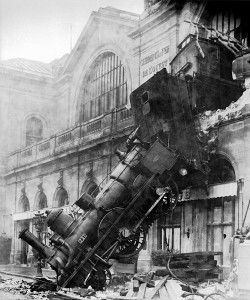The California train to nowhere
By B. Wayne Hughes Jr.
This past July, the California Legislature approved starting construction on the first 130 miles of the much hyped high-speed rail from San Francisco to Anaheim. That’s an ante of $8 billion just for a seat at the table.
As many of you may know, the state budget is woefully underfunded at around $90 billion. And even though initial monies for the train are federally funded, as a businessman, I would never accept the scheme: Once it starts, they’ll argue it has to be completed. Yet, with no prospect of long-term funding, this is “the train to nowhere.”
But the legislators who voted for this stupid project will be long gone while taxpayers struggle to pay off the bonds.
The pharaohs had the pyramids. And California politicians want to build monuments to their tenure in office. They would argue they are forward-looking visionaries dedicated toward a future that holds greater promise for generations to come. It’s a dubious legacy paid for by those future generations.
But others would argue, as do I, that while today’s politicians enjoy the glory of what few voters take to be a bold vision, the reality is that these politicians will be living off their taxpayer-funded pensions while our children struggle to pick up the growing tab for their reckless wastefulness.
Ego trip
The bullet train is a case in point. At best, it is an ego trip for the politicians who boost it. At worst, it is the ultimate expression of crony labor-capitalism, in which special interests — unions and vendors — enrich themselves at the expense of the public purse. This is the elephant in the room. It’s truly a political pachyderm (my apologies to the GOP figure).
The best case, then, is that the politicians who support this 500-mile “fast train” are on an ego trip, using our tax money, to get a high. And, over the short-term, they take credit for the alleged growth in jobs, as they conveniently ignore the jobs lost through a greater tax burden to fund yet another dubious program. Why not instead cut the regulatory and tax burden to attract new industries and businesses and encourage job growth in California? What happened to Google’s self-driving car?
Consider, the Federal government is borrowing money from China to make grants to state and local governments for all sorts of questionable projects. This used to be called “pork-barrel” legislation. More recently, U.S. senators and members of the House of Representatives have used “earmarks” to attach spending programs for their state or district to other legislation. It’s a self-serving game, where each politician trades favors for his pet projects, until the legislation has enough “Christmas tree ornaments” to get a majority of votes to pass.
Bribes
Yet, some governors have refused the federal bribes to pursue various federal grant programs, such as the Bullet Train. That’s because these programs come with conditions that typically require the state, county or city government to spend more money over a period of years, sometimes many years. It’s like buying too much of something at Costco. Seems like a great price, but you end up buying more than you need, and the food spoils or the merchandize expires.
Suppose you did this, not impulsively or occasionally, but all the time. That’s what it’s like with these federal programs, in which the feds provide continuous grants, conditioned on you (the state or local government) spending a certain amount of money.
Now, let’s talk about the worst case. When you look at a massive project like the Bullet Train, you’re talking about lots of companies and unions that stand to gain. And who funded the campaigns for the politicians? The companies are contractors and sub-contractors, as well as the many lobbyists, public relations people and other incidental staff.
Then there are the unions whose members will get more work, often at wages higher than in pure private sector jobs. The union leaders want their members to stay in the union, because union members provide a steady stream of dues money to fund the union’s organization and office, and the salaries, expense accounts and pensions of union leaders. Crony capitalists lobby for favored routes or zoning allowances.
Environment
Ironically, many of the liberals from central casting who would normally support High-Speed Rail felt the proposed route was an environmental disaster. The Sierra Club objected to Gov. Jerry Brown’s proposal to protect the train from environmental lawsuits. Bureaucrats rejected a more sensible route along I-5, the major north/south thoroughfare of California, in favor of blazing a trail through God knows where.
Even if this High-Speed Rail seems desirable, any “yes” has to be conditioned on cost. In the 1990s, California Congressman Jim Costa promoted a $10 billion state bond initiative for a project that supposedly would not require a state tax subsidy. Thus, the bulk of the then-estimated $33 billion project would come from the private sector and the federal government.
The latter is, of course, always depicted as free money. Once voters approved a 2008 ballot measure, the cost suddenly went from $33 billion to $43 billion. Then-Attorney General Jerry Brown refused to investigate what critics have called a “bait and switch.”
It’s very significant that investors want revenue guarantees that the government can’t provide because the guarantees don’t pencil out. The expected high-ticket prices would rule out most riders. It’s also worth mentioning the project starts equidistant from its two end points (kind of like insurance that something has to get built because we started out 300 miles away from anywhere).
The price tag is now $68 billion, and it could run to $100 billion. Once again, California is leading the way to an unsustainable future.
B. Wayne Hughes Jr. is a California businessman whose interests include philanthropy and public policy.
.
Related Articles
CA bullet train: Parade of bad news continues
April 11, 2013 By Chris Reed On Wednesday, there was yet another negative headline coming out of Sacramento about the
7 ways James Fallows is wrong about the CA bullet train
Writing on The Atlantic’s website, the much-respected journalist/intellectual James Fallows — a Redlands native who knows California better than nearly
No Silver Bullet For Rail Plan
JAN. 25, 2012 By KATY GRIMES Like Dracula rising from the grave, High-Speed Rail just won’t die. Even with the




